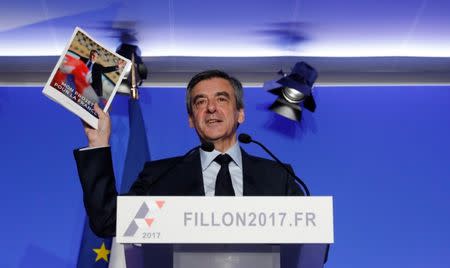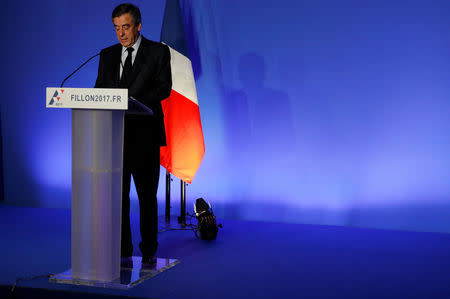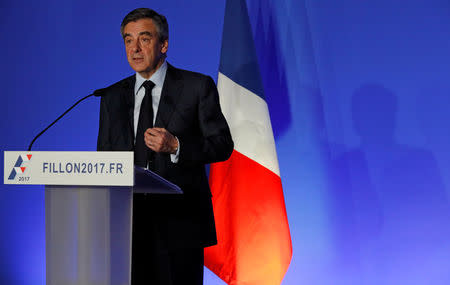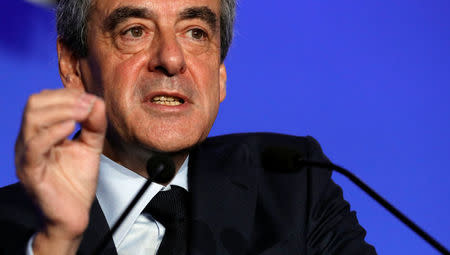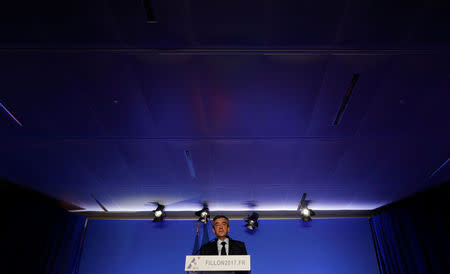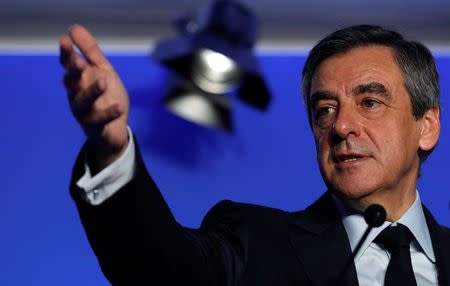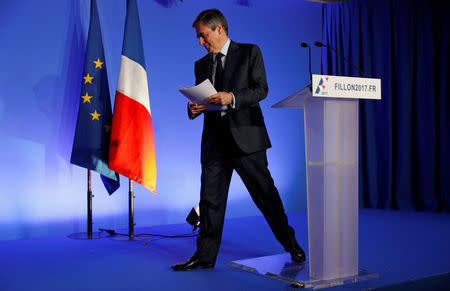Fillon's campaign relaunch marred by gifts of luxury suits
By Leigh Thomas PARIS (Reuters) - Francois Fillon outlined his plans to streamline the state's role in France's economy on Monday as he sought to revive his faltering presidential campaign, but again found himself on the defensive, this time over expensive suits he accepted as gifts. With six weeks to go until the first round of voting, the former prime minister who was once favourite to win the presidency is battling to rally supporters and keep his centre-right alliance on his side after allegations of financial impropriety. In a blitz of media interviews and a news conference, Fillon, an open admirer of former British Prime Minister Margaret Thatcher, spelled out his plans to reinvigorate France's regulation-laden economy. "I want to make 100 billion euros ($107 billion) of savings over five years and reduce by 500,000 the number of public sector jobs," he said at the news conference. "My programme is based on an ambition to make France a great political and economic power." Once again, however, Fillon's attempts to reset his flagging campaign were troubled by potentially damaging stories of high living that sit awkwardly with his claim at his party's primary last November to be beyond reproach ethically. The Journal du Dimanche newspaper on Sunday reported that Fillon had received close to 50,000 euros worth of suits and clothing since 2012. Fillon acknowledged a friend had given him two suits in February this year, adding: "and so what". He gave no further details on the provider of the gift and said the story was proof of a campaign to wreck his presidential bid. "I cannot see this as anything other than a manhunt," he told Europe 1 radio. Fillon's new offensive comes two days before he is due to meet judges investigating the hundreds of thousands of euros of taxpayers' money that he paid to his wife Penelope and his children for work they did for him. He reiterated policies to end the 35-hour working week, a move that would be fiercely opposed by France's muscular unions, and gradually raise the retirement age to 65 from 62 at present. His updated manifesto also includes a pledge to demand lawmakers disclose whether they employ family members as staff. "WE'RE GOING TO LOSE" The "Penelopegate" scandal has tainted Fillon's reputation as a clean politician and knocked him from first to third place in opinion polls. That would see him crash out in round one of the ballot on April 23 in favour of far-right leader Marine Le Pen, who is campaigning on a platform to pull France out of the euro, and centrist Emmanuel Macron, the new frontrunner. Fillon has said that magistrates are likely to put him officially under investigation on counts of suspected misuse of public funds but, contrary to what he initially announced, has declared he will not drop out of the race if that happens. Fillon won the public backing of his The Republicans party last week another former prime minister, Alain Juppe, ruled out challenging him. He again brushed the debacle aside on Monday, saying: "In democracy, there is only one thing that matters, it's the will of the people. The French will decide." One Juppe ally told Reuters such comments were a cause for concern. "We share 95 percent of Fillon's manifesto but less and less the slogans and the populism. We're going to lose this election." In another blow to Fillon, his party was forced to apologise during the weekend for tweeting a caricature of Macron that Fillon himself admitted was anti-Semitic. Fillon has accused the media and the judiciary of bias in the affair. He insists he did nothing illegal and that he is the victim of politically motivated reports designed to destroy his bid for power after five years of Socialist Francois Hollande. An opinion poll released on Monday again showed Fillon thrown out of the presidential race in the first round, taking 20 percent of the vote to Macron's 25 percent and Le Pen's 27 percent. The Opinionway poll foresaw Macron beating Le Pen in the May 7 runoff by 62 percent to her 38. ($1 = 0.9373 euros) (Writing by Brian Love and Richard Balmforth; Additional reporting by Yves Clarisse and Ingrid Melander; Editing by Richard Lough)

 Yahoo News
Yahoo News 